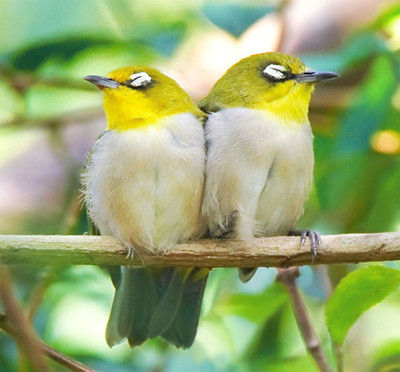(单词翻译:单击)
We usually think of evolution as something that happens over eons, in remote places where people rarely venture. Not something that happens around the backyard birdfeeder in just a few decades. But a study in the journal Current Biology suggests that feeding birds in winter can influence their course of evolution.
在我们的通常印象中,物种进化需要经历长久的时间,且发生在人迹罕至的地方,似乎跟在自家后院喂了几十年野鸟八这种事竿子打不着。不过《当代生物学》杂志上的一项研究却表明,在冬季向鸟类投食可能会影响到它们的进化进程。

The birds in this study were Central European blackcaps, a common kind of warbler. In spring, they breed in southern Germany. And when winter comes, they all fly south to the Mediterranean. At least they used to. In the 1960s, folks in Britain started putting out seed in winter. And the blackcaps split into two distinct groups. One goes to Spain to nosh on fruits and olives, the other heads north to take advantage of the easy English pickin’s.
进入生物学家们视野的这种鸟名叫黑头莺,欧洲常见的一种鸣鸟。春季的时候,它们在德国南部生育繁殖;到了冬天,它们就向南飞到地中海地区越冬。至少,这些黑头莺以前是这样迁徙的。而从上世纪60年代开始,英国的民众们开始在冬季的时候向户外投食。这些黑头莺就此开始分裂成两个族群,到了冬季,一群飞往西班牙啃水果和橄榄,而另一群则飞到北边的英国不劳而获。
The two populations may even be splitting into two species. The blackcaps that winter in England tend to mate with each other when they return to Germany. So they’re starting to look different from the birds that go south. Their beaks are longer and narrower, less suited to supping on Spanish olives. As birds of a feather, they definitely flock together. And to some degree, they have a bunch of bird-feeding Brits to thank.
而这两个族群更有可能从此进化成两种不同的物种,那些冬季呆在英国的黑头莺在飞回德国繁衍后代时,更趋向于和同道中鸟喜结连理。这样,它们渐渐和那些到了冬季往南飞的黑头莺们在外表上出现差异,它们的鸟喙显得更狭长,这种形状的鸟喙在啄食西班牙的橄榄时可是大大不便。而它们的羽毛,较之自己的亲戚们也显得更加稠密。说起来,这还多亏了英国人民的帮忙。


